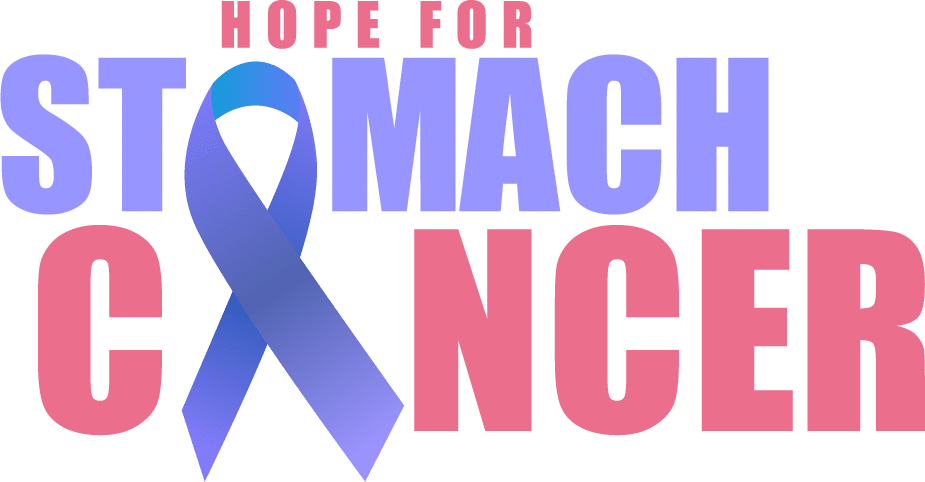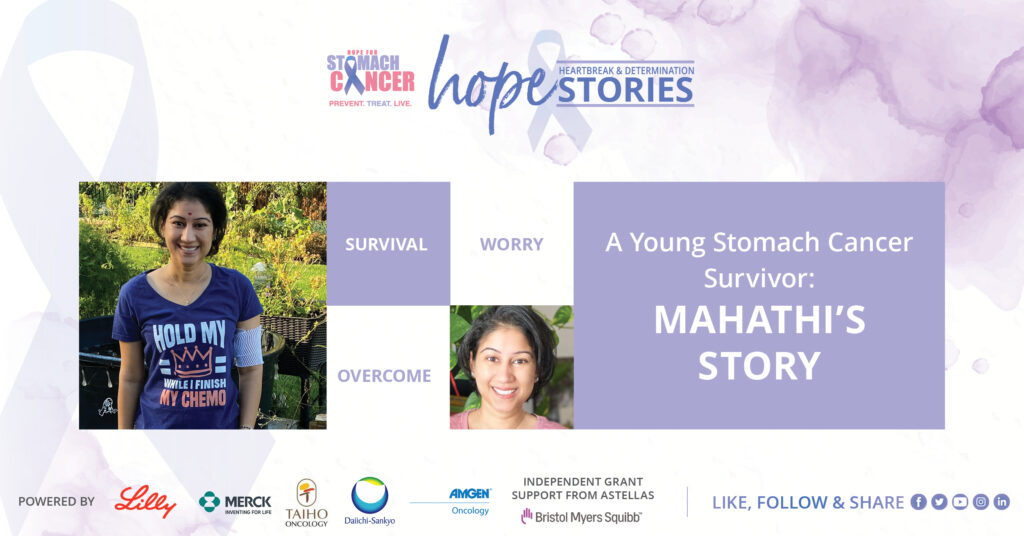Hope for Stomach Cancer recently sat down with Mahathi Vojjala. At 31, Mahathi was recently married and looking forward to starting a family. Receiving an unexpected stomach cancer diagnosis in the prime of her life upended those plans. Her perspective as a young stomach cancer survivor teaches lessons of patience and perseverance in the face of uncertainty.
Q: Thank you so much for sharing your experience as a young stomach cancer survivor, Mahathi. Can you please tell us a little bit about you and the events leading up to your diagnosis?
A: I’m currently 32 years old, and I’m a Ph.D. student studying epidemiology at NYU’s School of Global Public Health. I live in New Jersey with my husband, to whom I’ve been married for four years.
Throughout my late 20s, I dealt with frequent acid reflux and burning stomach pains. I saw doctors on and off over the years, and they suggested various ways to manage acid reflux. These include lifestyle and diet changes, over-the-counter medications, and other basic treatments.
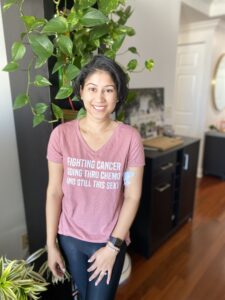 Early meetings with doctors & H.pylori concerns
Early meetings with doctors & H.pylori concerns
Naturally, they assumed that reflux in a young person with no significant medical history could likely be attributed to a poor diet. Doctors were frequently dismissive of my concerns. Further, they didn’t acknowledge the fact that I spent my young life in India, where Helicobacter pylori (H. pylori) infections are highly common.
More than half of the world’s population has likely been infected with H. pylori bacteria. However, many people don’t experience symptoms. For those who do, the bacteria frequently causes painful ulcers, bloating, loss of appetite, burping, and stomach pain. I had many of these symptoms, yet I was never tested for the bacteria.
A trip to the ER
I continued cycling in and out of occasional meetings with doctors for my stomach troubles until October 2021, when I was hospitalized with severe stomach pain. The sensation was so overwhelming that I couldn’t even sit up straight.
The ER doctor said that I likely had acid reflux, but referred me to a GI doctor for further evaluation. The GI doctor tested me for h. Pylori and performed an endoscopy, which revealed a large stomach ulcer. The doctor treated me with a course of medications and suggested that I schedule a follow-up appointment a few months into the future.
Following the treatment, I was feeling quite well. However, I decided to schedule a follow-up visit in February 2022. My main motivation was to ensure that everything was clear so that my husband and I could focus on starting our family.
To my dismay, an endoscopy revealed that the ulcer was still present and had not changed. The doctor’s next recommended steps involved getting a CT scan and waiting for the biopsy results. It was a Monday when the doctor did these procedures, and I went back to school, as usual, the following day. On Thursday of the same week, February 10, the doctor called me with news – the biopsy results were back. I had a signet ring cell poorly differentiated adenocarcinoma. In other words, I was facing an aggressive, fast-spreading form of gastric cancer.
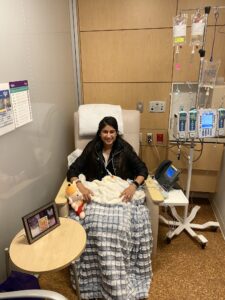 Q: It must have been shocking to receive that diagnosis – especially as you were studying and getting ready to start a family. What did your course of treatment look like?
Q: It must have been shocking to receive that diagnosis – especially as you were studying and getting ready to start a family. What did your course of treatment look like?
A: We were floored by the news. I never expected to be diagnosed with stomach cancer at 31. Of course, we immediately had questions and concerns about the future. My husband dove into medical journals and resources to unearth every last bit of information that he could find regarding my diagnosis.
On the other hand, I refused to read anything about it. The GI doctor told me to remain hopeful and to not make any assumptions until my staging appointment, which was yet to come. In the meantime, I discussed the diagnosis with my friends and family members who are physicians. They gave me a high-level view of what to expect in the coming months.
NYU Langone was a natural choice for my treatments. In addition to being close to home, I worked there, so I felt very comfortable with the team there. I saw Dr. Paresh C. Shah, a leading surgical oncologist at NYU Langone. Immediately, I jumped into a whirlwind of appointments, scans, consultations, and tests. This included an 11-hour day at the hospital where the staff conducted a PET scan, another CT scan, and another endoscopy.
It’s hard to convey how astoundingly efficient the entire process was. Within eight days, my oncologist had my comprehensive treatment plan ready.
Treatment plan details & life changes
What we knew so far was that I was in the early stages of stomach cancer. We decided to proceed with a subtotal gastrectomy first, which was scheduled for March 7th. Prior to surgery, I had undergone genetic testing which revealed I was negative for the CDH-1 gene – thank goodness. After the surgery, they would test my lymph nodes to determine whether I’d need chemotherapy.
As my story about stomach cancer was unfolding, I was also thinking about family planning. I had yet to see how being a young stomach cancer survivor could affect my ability to bear children. So, to be safe, my husband and I opted to do IVF after the surgery. We didn’t want to miss the opportunity to start our family. We proceeded with IVF with the intent to freeze embryos for the future since the chemotherapy process would start right after retrieval.
The partial gastrectomy
Fortunately, my surgery went very well. Dr. Shah did a phenomenal job. Prior to the procedure, he walked me through every step that would take place and explained what my recovery would probably look like. I had a textbook recovery that aligned almost perfectly with what he’d told me.
As I’d expected, recovery was rough, and I fainted about a week after getting home due to the lack of hydration and food. Just three weeks after the surgery, I became sick with COVID. This was frightening given my fragile state, but I was able to manage. Then, just two weeks after recovering from that, I went in for IVF. Needless to say, I didn’t have a ton of downtime following this major surgery!
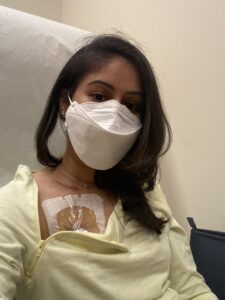 Lymph node testing & chemotherapy
Lymph node testing & chemotherapy
Completing the surgery was a major milestone. However, there were more hurdles to come – testing showed that I had cancer in two of my lymph nodes. Therefore, we’d need to move forward with chemotherapy. My oncologist, Dr. Paul Oberstein (also at NYU Langone), started me with 12 rounds of FOLFOX in May 2022.
There is no way to state it gently – chemo is the worst thing that I’ve ever experienced. It’s physically and emotionally taxing, not to mention devastating for a young person who is used to leading an active lifestyle. Further, it has cumulative effects, so each round is worse than the last.
My side effects were extreme. I’ve experienced a lot of neuropathy in my hands and feet, and intense sensitivity to cold. Even in the heat of summer, I found it unbearable to go into the basement of my family’s house or to grab items from the fridge. Further, there are tons of unpleasant GI symptoms, like nausea, diarrhea, and constipation. I barely had an appetite; it was as if there was a plastic film inside of my mouth that impeded my ability to taste.
Despite how awful this has been, the wonderful news is that I’m finally done with chemo. I’m about to start a long break to relax and recover, and my family is putting together a huge party with friends, colleagues, and relatives to celebrate. This feels like a major milestone!
What the future looks like as a young stomach cancer survivor
Now that chemo is ending, I’ll be meeting with my oncologist soon to plot out my cancer recovery plan. We’ll also be doing some post-chemotherapy scans to see how everything is looking now. So far, I do know that I’ll be starting immunotherapy at the end of the year.
My goal is to be clear of this disease two years from now – that is a significant marker for people who have had gastrectomies. Then, I want to be clear at three years and finally five years. Reaching each of these milestones is very important to me.
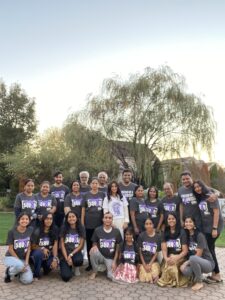 For now, I’m focusing on regaining strength and getting used to my new body. Everything has changed – as a young stomach cancer survivor, I see how this disease completely upends lives. I was a busy Ph.D. student pursuing big dreams and preparing to have kids. But this last year ripped me from my routine and forced me to slow down.
For now, I’m focusing on regaining strength and getting used to my new body. Everything has changed – as a young stomach cancer survivor, I see how this disease completely upends lives. I was a busy Ph.D. student pursuing big dreams and preparing to have kids. But this last year ripped me from my routine and forced me to slow down.
Through all of this, I’ve been so grateful to have amazing family and friends who have offered me unflagging support. In many ways, this illness has an infantilizing effect – the people who love you want to jump in and do everything for you, which is touching yet frustrating at the same time. I want to reclaim my independence as I heal. And of course, I want to eventually finish my Ph.D. and have the family I’ve been dreaming of.
Q: It’s inspiring to hear your story of strength and perseverance. You’ve already been through so much as a young stomach cancer survivor – what is your hope for the future?
Once I’m ready, I want to dive into studying stomach cancer from an academic perspective. I hope we can get to a place where we can prevent young adults from receiving a late diagnosis. So many people receive the news when they’re already in the late stages of this disease, and they simply don’t live long enough to tell their stories.
It’s worth noting that many of the clinical trials and data surrounding stomach cancer involve older patients since that is the typical demographic. I want to thoroughly understand stomach cancer as it presents in young people. I hope to research preventative methods that could benefit entire communities. This disease sent my life into a temporary tailspin and created a new sense of uncertainty for my future. However, it also gave me a focus and purpose for the future that I know could help many people.
2023 Updates
In January of 2023, I decided to start immunotherapy. Despite being cancer-free, I wanted to do everything I could to prevent a recurrence.
Immunotherapy is an adjuvant treatment for me, meaning we’re using it as a supporting treatment to keep the cancer from returning. So far, it’s been going well, but it’s tricky to estimate its effectiveness since immunotherapy is often done in conjunction with other treatments.
During my first session in January, I had a mild allergic reaction. I had to take antihistamine medications to combat the side effects. I’ve done 10 infusions now, and most have gone well, except for my most recent treatment. I had another severe reaction, resulting in hives and a rash all over my body, so now I’m taking steroids to control the hives, and I’m having to delay my next immunotherapy infusion.
Throughout this process, I’ve observed that physicians may be unfamiliar with immunotherapies. Outside of my cancer care team, I’m still seeing general doctors and other medical professionals. Mixing medications can lead to serious reactions and complications. It’s important to not assume that every specialist you see understands your cancer treatments, especially the novel targeted treatments such as immunotherapy.
My goal has largely remained the same since the end of 2022: I want to do everything I can to stay cancer-free for two years. The two-year mark represents a major milestone, and if I can be cancer-free for that long, I’ll be quite optimistic for the future.
2023 also showed me the importance of mental health. When I was in the thick of my treatments, I had numerous visitors, tons of support, and many people who checked in on me. After the treatments ended and I was declared cancer-free, we had huge parties with friends and family. I had an outpouring of support and felt a strong sense of community. Naturally, once my life was no longer in immediate danger, people re-focused on other priorities. It took a lot of therapy, introspection, and journaling to work through my emotions and face constant anxiety.
There is no returning to “normal” after cancer. Instead, I’m adapting to a new way of living, where I celebrate my small wins like commuting to work or eating certain foods. Despite the challenges, I look forward to the achievements that give me hope, like finishing my Ph.D. and having a family someday.
